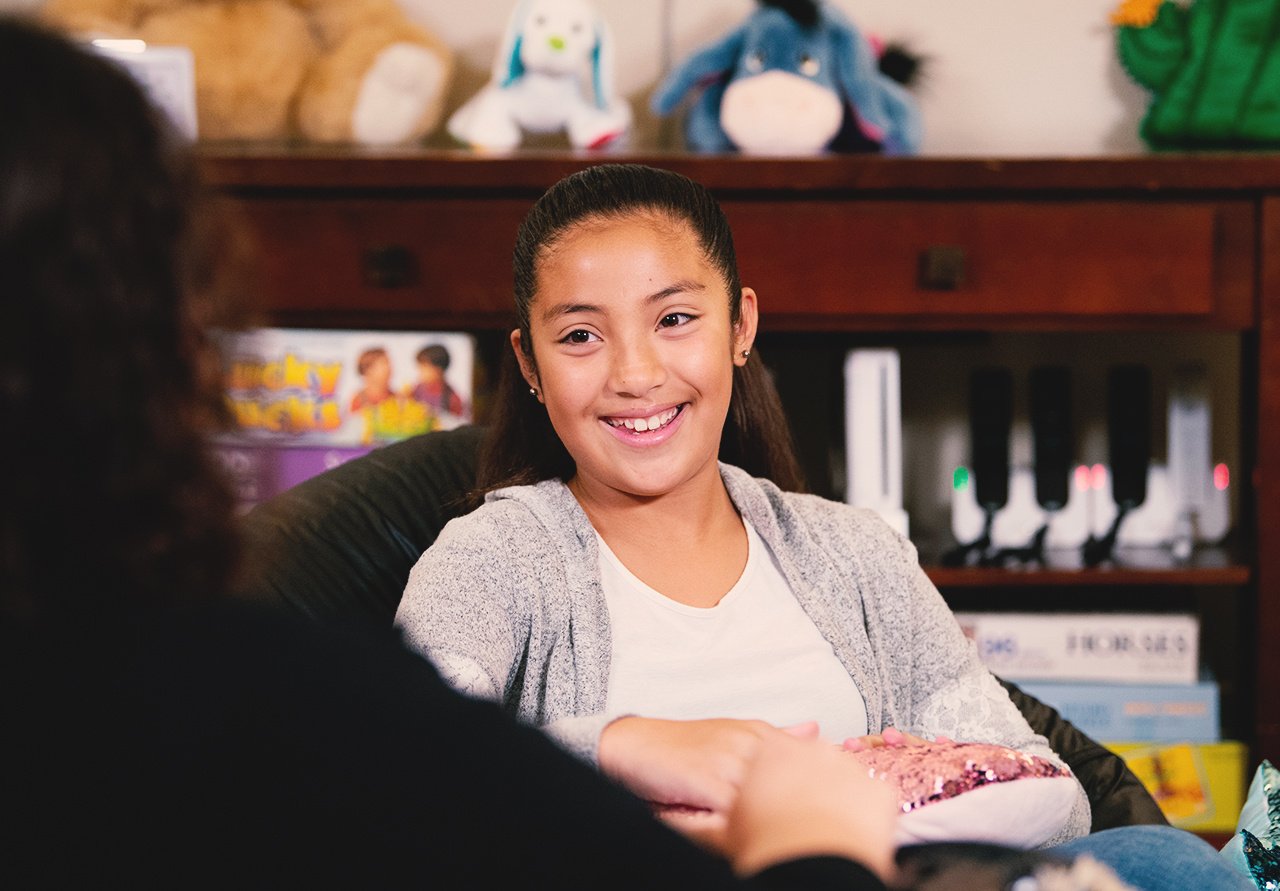.png)
Wisconsin teens are experiencing a mental health crisis.
According to the state Office of Children’s Mental Health:
- 52% of Wisconsin high school students reported anxiety
- 24% of girls seriously considered suicide
- 21% of high-school-aged teens reported self-harm
These statistics highlight a pressing need for support. One in seven teens will experience a mental disorder, and half of all lifetime mental illnesses start at age 14.
Figuring out how to engage a resistant adolescent in therapy isn’t always easy. Many teens see therapy as something meant only for people who are “broken,” in crisis, or as a sign of weakness, which can make them reluctant to give it a chance.
Small, thoughtful actions can help you shift their perspective. Therapy isn’t only about addressing struggles like anxiety and depression. It’s a tool for growth, a way to navigate challenges, and an opportunity to work toward the healthy life they envision.
Here are some practical tips for how to engage a resistant adolescent in therapy and help them take that first step to healing.
Understanding Resistance in Teens
What looks like refusal often comes from deeper concerns, like losing autonomy, not fully understanding what therapy is, or worrying about being judged. Addressing these concerns helps alleviate them.
Lack of Autonomy
Teens value the ability to make their own choices. When therapy feels like it interferes with that freedom, resistance can follow. This behavior is often a response to feeling that their independence is being overlooked. Helping them see therapy as a collaborative effort rather than an intrusion can reduce these feelings and encourage openness.
Misconceptions About Therapy
There’s no shame in seeking help. Everyone faces struggles, and talking with a professional can make life’s challenges easier to manage. You can help normalize therapy by talking about it openly, reassuring teens that it’s okay to ask for help, and framing it as a way to improve self-care. Teenagers benefit most from therapy when they view it as a resource, not a sign that something is “wrong.”
Meeting with a therapist is no different than visiting a doctor to support your physical well-being. The goal remains the same: to feel better. Presenting it as a tool for growth can make teens feel more confident and encouraged to prioritize their mental health.
Fear of Judgment
Opening up can feel risky, especially when you’re trying to figure out who you are. Teens wrestle with challenges at school, questions about their identity, and deeply personal concerns. They might worry about how others will perceive them and fear labels, rejection, or simply being misunderstood. These feelings create a barrier, making staying silent seem easier than exposing their emotions.
Don’t mistake reluctance for unwillingness. It often stems from a need to protect themselves from potential pain. When someone feels uncertain or vulnerable, the idea of being truly seen can be overwhelming. Be patient and understanding, and show them that sharing isn’t about being judged — it’s about being heard.
Mental Health Barriers
Facing anxiety, depression, or suicidal thoughts makes seeking support feel even more challenging. These struggles often intensify feelings of shame, isolation, or hopelessness. When you feel lost or like you don’t even know which way is up, reaching out can seem like an insurmountable task.
- Anxiety: Uncertainty about therapy creates fear. Questions begin to swirl in your head. What will sessions involve? Will you be judged? Are you beyond help? When teens are panic-stricken over the very idea of therapy, opening up can feel impossible.
- Depression: Depression can sap motivation and make teens feel like there’s no point in seeking help because it won’t change anything. They may not even believe that they deserve care. That perspective often makes going to therapy seem more like an unwanted chore than a helpful resource.
- Suicidal Ideation: Talking about these thoughts can make teens very deeply vulnerable, even with someone they trust. They might fear being misunderstood or labeled. They could also be afraid of the consequences of talking about it, like involuntary treatment, hospitalization, or losing control over their decisions. Instead of seeking support, they may withdraw and try to handle these feelings on their own.
Approach these topics with empathy and care. Let them know that therapy is a safe, judgment-free space to talk about these feelings and that they don’t have to face these challenges alone. Reassure them that seeking help is a sign of strength, not weakness.
Creating a Safe and Empowering Environment
The teenage years bring unique challenges. Teens begin exploring independence while still building their sense of self. It’s natural to push back against anything that feels imposed, including therapy. Teens might question therapy’s purpose, feel unsure about trusting an unfamiliar adult, or worry that participating means giving up control.
These concerns aren’t roadblocks. Think of them as part of their developmental journey. When you show respect for their need to feel understood, you help create a space where they feel safe to engage. Building that trust starts with listening and acknowledging their perspective, which can turn resistance into curiosity and confidence in the process.
Communicate Openly
Create moments where your teen feels comfortable sharing their thoughts. Everyday activities, like making food or walking together, can naturally lead to meaningful conversations. These relaxed interactions often make it easier for them to open up. Listen when they speak, letting pauses settle without rushing to fill them. A gentle prompt or encouraging word can invite them to share more when they’re ready.
Validate Their Feelings
Respect their boundaries and emotions to show your teen that their feelings matter. Let them decide what they’re ready to discuss without fear of being judged or dismissed. When they express themselves, acknowledge their emotions, and validate their experiences, even when the topics are challenging.
Protecting their privacy and honoring their confidence helps reinforce that your relationship is a place of understanding and support. This trust nurtures stronger connections and lasting openness.
Empower Decision-Making
Teenagers should have a voice in decisions about their well-being. When they have a say, they feel valued and more in control. Instead of directing them toward therapy or other solutions, explore options together and consider what feels right. Discuss the benefits of different approaches and ask for their input. Collaboration builds confidence and helps teens take ownership of their choices.
If therapy becomes part of the conversation, resources like therapy for teens can provide helpful guidance. Supporting their autonomy in a safe, empowering way builds trust and motivates them to take an active role in their growth.
Foster Mutual Understanding
When you listen without judgment and acknowledge emotions, you show teens their voice matters. Creating space for honest conversations while honoring their boundaries strengthens your connection. Encouraging their choices fosters confidence and creates a foundation of care. These intentional efforts help them feel valued and understood, leading to stronger relationships, greater empathy, and openness to therapy.
Reframing Therapy as a Pathway to Teens’ Goals
Therapy is more than a place to discuss challenges. It offers a space for teens to grow, set meaningful goals, and work toward becoming who they want to be. With guidance, they gain the tools to understand themselves, face challenges, and build a future they feel proud of.
Therapy can provide vital support for teens struggling with stress, anxiety, or depression:
- Explore Identity and Belonging: Therapy offers an environment where teens can explore questions about who they are and where they belong, fostering self-acceptance and confidence in their identity.
- Encourage Self-Discovery: Therapists help teens uncover their strengths, values, and goals. Teens gain a deeper understanding of who they are and a clearer sense of who they want to become.
- Improve Emotional Awareness: Teens learn to recognize, name, and process their emotions in healthy ways, helping them respond thoughtfully instead of reacting impulsively.
- Build Emotional Resilience: As teens work through challenges, they develop the perseverance and confidence to manage future setbacks with a positive mindset.
- Develop Problem-Solving Skills: Therapy equips teens with strategies to approach everyday challenges with confidence and creativity. They learn how to break problems down into manageable steps and find practical solutions.
- Strengthen Coping Skills: In therapy, teens learn to build healthy habits for managing stress and emotions. Mindfulness tools and relaxation techniques offer lifelong strategies for navigating challenges.
- Improve Communication: Teens learn how to express themselves clearly and assertively. These skills help them navigate relationships, advocate for their needs, and resolve conflicts effectively.
How to Engage a Resistant Adolescent in Therapy: Final Thoughts
Every teen deserves a space where they feel heard, valued, and supported. Therapy creates that opportunity, helping them discover their strengths and set meaningful goals for the future. Partnering with Rawhide can be the first step in creating lasting growth. Take that step today by scheduling an appointment and investing in their future.










